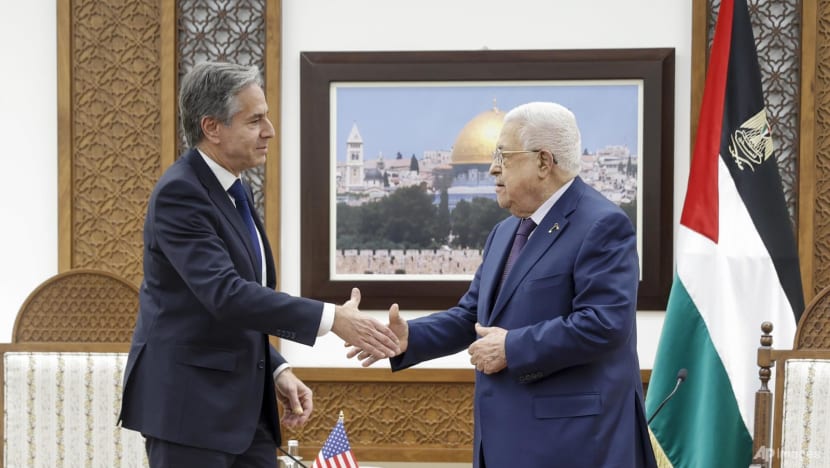Palestinian Authority’s leadership in a post-Hamas Gaza could be beneficial despite lack of legitimacy, say analysts
US Secretary of State Antony Blinken made a surprise visit to Palestinian President Mahmoud Abbas on Sunday and told him that Washington sees the PA playing a “central role” in Gaza if Hamas is removed from power.

US Secretary of State Antony Blinken meets with Palestinian President Mahmoud Abbas amid the ongoing conflict between Israel and the Palestinian militant group Hamas, at the Muqata in Ramallah in the Israeli-occupied West Bank, Nov 5, 2023. (Photo: Jonathan Ernst/Pool photo via AP)

This audio is generated by an AI tool.
The Palestinian Authority (PA), which exercises limited self-rule in parts of the West Bank, has potential to return to power in the Gaza Strip in a post-Hamas scenario – at least in the short term – despite its lack of popularity, analysts said on Monday (Nov 6).
This comes as the United States turns its attention to a future of a possible power vacuum in the area if Hamas is removed from power.
US Secretary of State Antony Blinken made a surprise visit to Palestinian President Mahmoud Abbas on Sunday, in his second trip to the region since Israel declared war on militant group Hamas with an aim of dismantling it.
Mr Blinken told Mr Abbas that the US sees the PA playing a “central role” in the future of the Gaza Strip.
While there has been no guidance yet on what that post-conflict state is going to look like or what the political situation will be, part of the purpose of the meeting was identifying possible pathways to a temporary governing system run by the PA in Gaza until a long-term solution can be found, political scientist Benjamin Radd from American university UCLA told CNA’s Asia First.
“Restoring Palestinian Authority connection to Gaza and bringing some leadership elements to that area would be very beneficial and I think that's what the US is going to try to secure,” said Dr Radd, whose expertise is in government and politics in the Middle East.
The Gaza Strip was governed by PA for about a decade until 2007, when Hamas took over the enclave after throwing out its leadership following a brief civil war.
PA LACKS LEGITIMACY
However, PA – largely seen as the caretaker of a degenerating security and political situation for Palestinians – lacks legitimacy amongst the public, said Dr Simon Pratt, lecturer of political science at University of Melbourne.
“It has very limited scope to really participate in whatever post-conflict outcome might emerge,” he told CNA938’s Asia First.
“It’s also relatively insignificant diplomatically at the moment, because whatever Abbas says or doesn't say will have no influence on what Israel does or what Hamas does.”
Still, with a “high probability” of a post-conflict situation involving some recommitment to the suspended peace process between Israel and Palestinians, “any negotiations that do occur will have to be with the Palestinian Authority”, he noted.
“It's not an irrelevant player,” said Dr Pratt, who specialises in international politics.
He added that “everybody's very concerned about what would happen if there were was a vacuum of power in the Gaza area”.
GAZA’S FUTURE
The discussion over Gaza’s future comes as US president Joe Biden’s administration focuses on what will happen to the area and who will run it if Israel achieves its war aim of dismantling Hamas.
One possibility under discussion in Washington is an interim government run by Arab states or the United Nations before “an effective and revitalised PA” takes over leadership.
However, Dr Pratt said that Israel's Arab neighbours do not want to be part of the final outcome.
“They have traditionally not really wanted to participate in any solution for the Palestinians and that is set to continue,” he said.
“Yet, they are part of the situation whether they want it or not, and partly because of the regional risks here. So I think they're going to be dragged – reluctantly – into a solution.”
Related:
CHANCES OF CEASEFIRE OR PAUSE
Gaza health officials said on Sunday that almost 10,000 Palestinians have been killed in the ongoing conflict, which began when Hamas launched a surprise attack on southern Israel on Oct 7, killing 1,400 people and taking more than 240 hostages.
Israel’s retaliation has devastated parts of the densely populated enclave, where food and water are running out and medical services are collapsing.
Mr Blinken called for Israel to temporarily stop its military offensive on Gaza to allow aid to enter but Israel’s Prime Minister Benjamin Netanyahu rejected such a “humanitarian pause” unless hostages held by Hamas militants are freed.
Despite being rebuffed, the US can deploy various methods to push for a ceasefire, said Dr Pratt.
This includes offering to resupply Israel’s munitions in exchange for allowing the entry of more humanitarian aid trucks or evacuations, he suggested.











.png?itok=9-XI0OqS)





